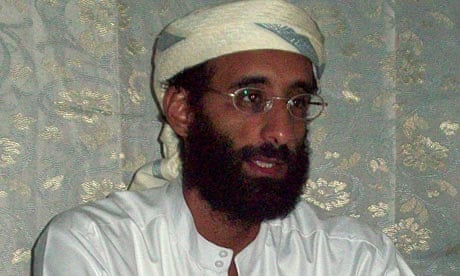Human rights advocates have criticised two US civil liberties groups for mounting a legal challenge to the Obama administration's policy of targeted assassinations by representing the interests of Anwar al-Awlaki, the Yemen-based radical cleric.
Last week, the Centre for Constitutional Rights (CCR) and the American Civil Liberties Union (ACLU) began a lawsuit in a federal court in Washington in connection with the US decision to authorise the killing of Awlaki, the only US citizen known to have been targeted for assassination.
The two groups have been retained by Awlaki's father, Nasser al-Awlaki. But a CCR board member has distanced herself from the group's decision to represent Awlaki's interests. Karima Bennoune, a law professor at Rutgers school of law, Newark, New Jersey, has gone public with her misgivings at the CCR's decision, reflecting a debate within human rights groups on how to deal with Islamist fundamentalists.
"I support the important work the centre has done on torture and extraordinary rendition," said Bennoune, "but I expressed grave concern at CCR offering to represent Awlaki's interests pro bono. Anwar al-Awlaki is not a detainee; he is still at liberty and able to gravely harm others by inciting and advocating murder."
Bennoune pointed out that Awlaki published an article in al-Qaida's English language magazine, Inspire, in July openly calling for assassinations of several people, including a young woman cartoonist in Seattle and Salman Rushdie. This was at around the time the CCR was offering to represent Awlaki's father, she said.
Bennoune, who is of Algerian descent, also expressed fears that the CCR and the ACLU were in danger of "sanitising" Awlaki to western audiences.
"Since the inception of the case," she said, "there has been increased mystification of who Anwar al-Awlaki is in liberal and human rights circles in the United States. This may in part have resulted from the fact that a highly reputable organisation like CCR was willing to represent his interests, and described him only as 'a Muslim cleric' or 'an American citizen', and repeatedly suggested that the government did not possess evidence against Awlaki."
The CCR has come under fire in the UK, too. Chetan Bhatt, director of the centre for the study of human rights at the LSE, who was approached by the CCR for advice on Awlaki, said: "I have considerable respect for CCR. But in this case they have made a serious error of ethical judgment. Does a highly respected organisation, founded in the midst of historic struggles for civil rights and racial justice, now wish to be perceived by some as al-Qaida's legal team? Can you fight extra-judicial assassinations by standing alongside someone who advocates extra-judicial assassinations?"
Five prominent Algerian non-governmental organisations, including associations of victims of terrorism and women's groups, have also sent a strongly worded letter to the CCR expressing their dismay that the group has decided to represent Awlaki's interests.
Vincent Warren, executive director of the CCR, argued that his group had actively opposed torture, indefinite detention and targeted killing for years by filing lawsuits against the US government, which few organisations had the capacity to do. "That's what we do," he said. "We file lawsuits. We had a dramatic effect on US policy and the treatment of detainees in Guantánamo."
As for the Awlaki case, Warren said the focus was on US policy and the US government "because we don't believe the US should be wreaking violence for political reasons. It should be up to a court, not just the US government, to decide whether Awlaki poses a threat. The US should not be conducting the killing of US citizens outside the legal process, far away from any battlefield."
The case echoes a dispute in the UK early this year when the head of Amnesty International's gender unit left the group because of its links with Islamist pressure groups. Gita Sahgal fell out with Amnesty after claiming that the charity's links with Moazzam Begg, a former inmate at Guantánamo bay, and his group, Cageprisoners, were undermining its campaign for women's rights.
Awlaki is the "spiritual leader" of al-Qaida in the Arabian peninsula and US officials believe the Islamist cleric, who was born in New Mexico to Yemeni parents, and once lived in London, is a key suspect behind the bombs sent as cargo on planes addressed to Jewish groups in Chicago.
Nasser al-Awlaki's lawsuit argues that international law and the constitution prevent the Obama administration from unilaterally targeting his son for death unless he presents a specific imminent threat to life or physical safety and there are no other means to stop him. The suit also seeks to force the government to disclose standards for determining whether US citizens can be targeted for death.
Bennoune said there were other ways of opposing targeted assassinations than the lawsuit from the civil rights groups. "You can pursue other forms of public advocacy or lobbying or grassroots campaigning. We have to oppose death lists of the US government but we also have to oppose calls for assassination by the likes of Awlaki. We have to find a way to navigate between Scylla and Charybdis."
